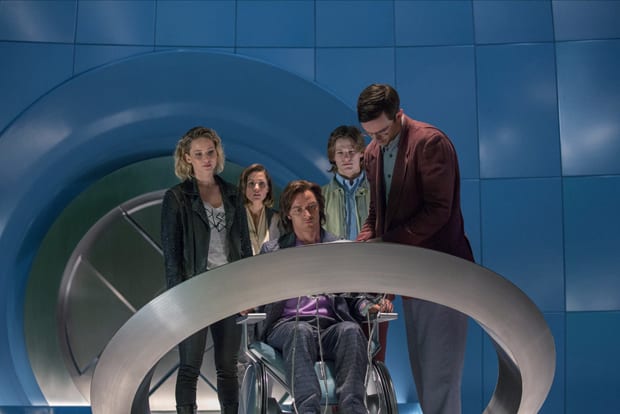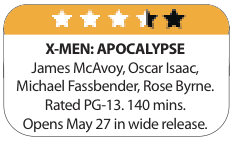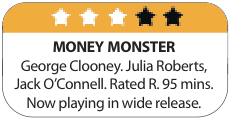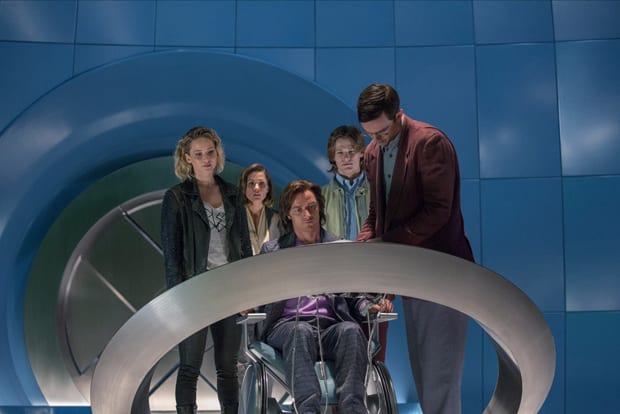Mutants fight for equality in Bryan Singer’s ‘X-Men: Apocalypse;’ ‘Network’ meets ‘The Truman Show’ in Jodie Foster’s ‘Money Monster’

The X-Men — including Prof. Xavier (James McAvoy), above center — try to save the world from the ‘Apocalypse.’
ARNOLD WAYNE JONES | Executive Editor
jones@dallasvoice.com
It sometimes seems like all Hollywood can churn out anymore are expensive comic book movies, and lately, all of them have the consistent theme of hero-vs.-hero: Batman v. Superman and Captain America: Civil War, and now X-Men: Apocalypse. More than the others, however, this seems of a piece with the entire X-Men franchise, which has always blurred the line between good and bad. Which may be what has made it one of the most interesting titles in the Marvel universe, and one that resonates most with gay audiences.
 Putatively wearing the black hats: Magneto (Michael Fassbender) and his crew — separatists who feel oppressed by the world of muggles, who label them as “freaks” and “outsiders.” It feels like such a plain metaphor that, at some points during Apocalypse, you half expect a politician to lobby for separate bathrooms based upon their mutation-at-birth. Magneto has undergone more than enough persecution in his lifetime, starting with his internment at Auschwitz and continuing through the deaths of others close to him (which we see played out here). Imprisoned as a Jew, demonized as a mutant … his rejection of mainstream society borders as much on Sylvia Rivera as on Osama bin Laden: You push someone hard enough, he will push back.
Putatively wearing the black hats: Magneto (Michael Fassbender) and his crew — separatists who feel oppressed by the world of muggles, who label them as “freaks” and “outsiders.” It feels like such a plain metaphor that, at some points during Apocalypse, you half expect a politician to lobby for separate bathrooms based upon their mutation-at-birth. Magneto has undergone more than enough persecution in his lifetime, starting with his internment at Auschwitz and continuing through the deaths of others close to him (which we see played out here). Imprisoned as a Jew, demonized as a mutant … his rejection of mainstream society borders as much on Sylvia Rivera as on Osama bin Laden: You push someone hard enough, he will push back.
That accounts for how, in the first two films of this trilogy of X-Men prequels (First Class and Days of Future Past are the others), Magneto and white-hatted Professor Xavier (James McAvoy) are often on the same side. Malcolm X or Mahatma? What are the paths toward equality? Is there a right and a wrong way, really?
Ultimately, there is a right way — the way that does not involve the obliteration of all of earth-based society. But the argument is more with the methods than the politics themselves. That’s expressed in how, in Apocalypse, En Sabah Nur (Oscar Isaac) — a long-dormant supervillain, thought to be the first mutant millennia ago — recruits four horsemen for his crusade against humanity: Magneto, Psylocke, Angel, Storm… at least two of whom are considered heroes by the time Ian McKellen and company take over the roles.
You expect bigness — of emotions and explosions — in a sci-fi actioner, but the performances here are quirkier and better than average, especially Fassbender and McAvoy, who always appear to be thinking. And director Bryan Singer seamlessly integrates several origin stories (for Cyclops, Storm and others) into the Bigger Picture stuff.
Indeed, Apocalypse builds on — or perhaps cribs from — Days of Future Past, especially in one comedic-action scene where Quicksilver (Evan Peters) speeds through the Xavier School, rescuing students so fast, explosions cannot keep up with him. The scene feels wrong, as if he has in fact exceeded the speed of light, but it’s pointless to examine the physics of a set-piece that’s so much fun. That’s both the appeal and the flaw of superhero films that routinely take us to the brink of annihilation: You get dazzled by how high the stakes are, but lost in all the debris. War is all hell, and superhero movies are all-out war.

A financial news host (George Clooney) meets a disgruntled investor in ‘Money Monster’ from director Jodie Foster.
Everything is business as usual at FNN, a thinly-veiled incarnation of CNBC, with George Clooney as Lee Gates, a thinly-veiled Jim Cramer wannabe — an entertainer who treats the stock market like a plaything and market fluctuations like the latest tweets from Kardashians. He even has a permanent cast of strippers to give audiences the ol’ razzle dazzle. Ultimately it’s not about investing, or even business news and information, but about ratings and buzziness — the financial equivalent of clickbait web posts.
Only Lee’s superficiality has worked against him this time. His flippancy led one disturbed investor, Kyle (Jack O’Connell), to sink his last dime into Ibis, a company that just took a nearly billion-dollar hit due to a “computer glitch.” Only Kyle is not buying it, so he’s taken the set of Lee’s show, called Money Monster, hostage. He wants answers, or he’ll blow up a bomb on live TV. (Imagine the ratings that would get!)
 There’s an honored tradition of outlaw-as-rebel-folk-hero stories throughout history, and the information age has made that possibility all the more expedient. Ever since a slow white Bronco chase got more viewers than the Super Bowl, popular culture has been obsessed with immediate exposure to celebrity. No longer do traveling troubadours have to write ballads to cement reputations — we have memes and Vines to do the work for us. You can be famous and irrelevant, often in the same day.
There’s an honored tradition of outlaw-as-rebel-folk-hero stories throughout history, and the information age has made that possibility all the more expedient. Ever since a slow white Bronco chase got more viewers than the Super Bowl, popular culture has been obsessed with immediate exposure to celebrity. No longer do traveling troubadours have to write ballads to cement reputations — we have memes and Vines to do the work for us. You can be famous and irrelevant, often in the same day.
That’s the underlying theme of Money Monster … as is an indictment of the financial markets, and journalism, and …. Yes, this movie has many targets in its sights, combining elements of Network, The Truman Show and The Big Short in one boiling real-time shit show.
I mean that in a good way — mostly. Director Jodie Foster manages to keep a lot of balls in the air at once, juggling all sides of crisis management with an indictment of American business. She owes a debt to Sidney Lumet’s Dog Day Afternoon with the complex intercutting and New York City setting, so what if it steers off course occasionally? Blame market forces. Or a computer glitch.
So… what’s on next?
This article appeared in the Dallas Voice print edition May 13, 2016.
















